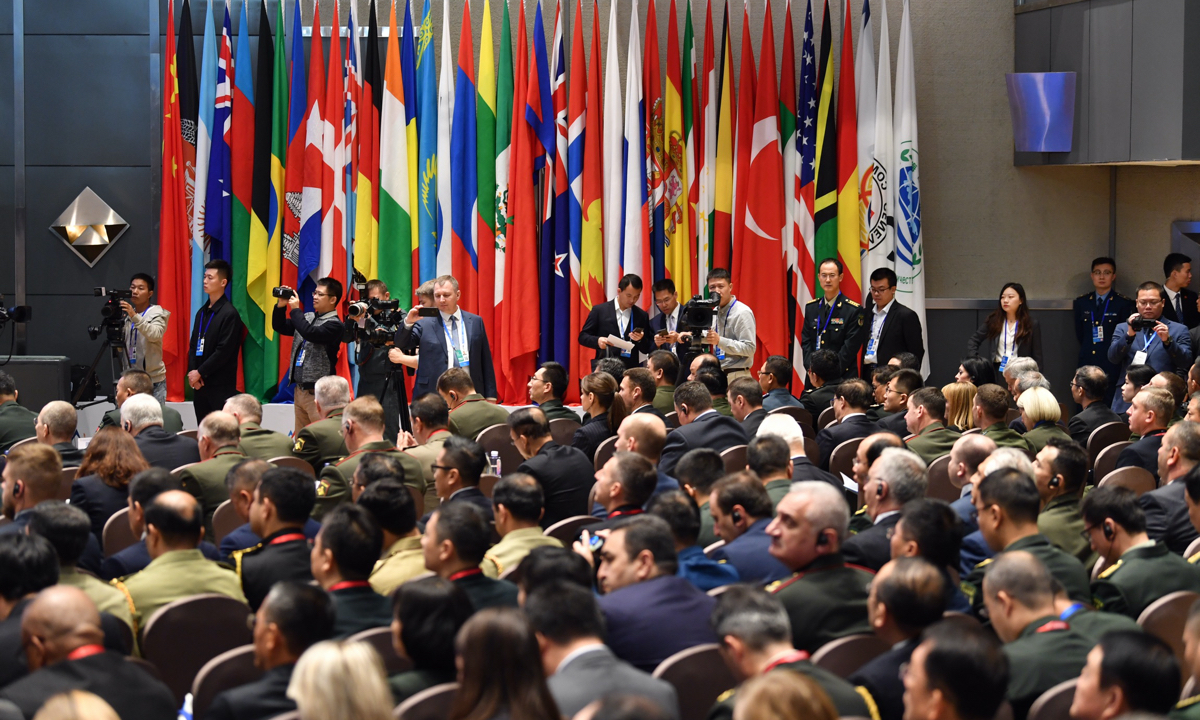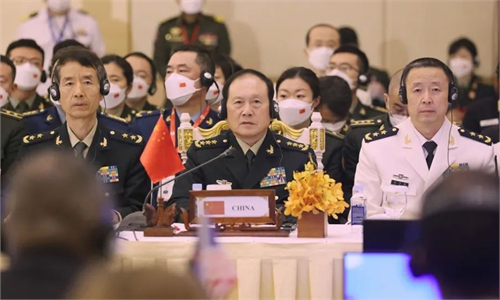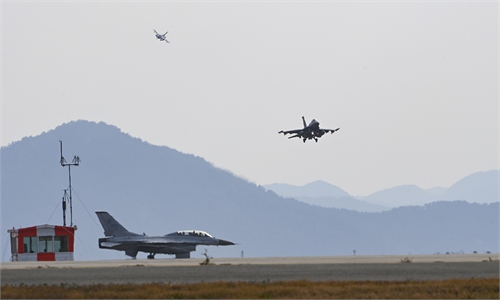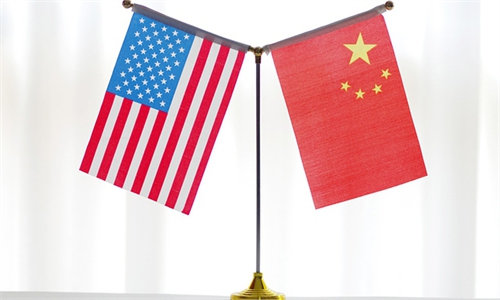Experts to engage in heated exchanges over solutions to intl security issues in expert videoconference of Beijing Xiangshan Forum

The 9th Beijing Xiangshan Forum held in Beijing, China, in 2019. Photo: VCG
Global experts, including those from China and the US, will likely engage in heated exchanges over different solutions to international security issues in the upcoming expert videoconference of the Beijing Xiangshan Forum, Senior Colonel Zhao Xiaozhuo, deputy director of the Beijing Xiangshan Forum Secretariat, told the Global Times on Monday in an exclusive interview.
The expert videoconference, scheduled for December 1 to 2 organized by the Academy of Military Sciences amid the intensifying international security situation, will not avoid sensitive issues, but instead focus on discussion of solutions to these issues, Zhao revealed.
He also said that depending on the situation of the epidemic, relevant parties all expect the 10th Beijing Xiangshan Forum to be held in 2023.
Initiated in 2006, the Beijing Xiangshan Forum has grown into a vital influential platform for dialogue over defense and security in the Asia-Pacific region. The forum has been postponed since 2020 due to the COVID-19 pandemic. Instead, yearly expert videoconferences and a series of academic symposiums were held by the Xiangshan Forum Secretariat.
So far, 40 experts from 14 countries and one international organization have confirmed they will attend this year's event, Chinese Defense Ministry spokesperson Wu Qian said a press conference on Thursday.
The international security situation has been worsening since 2020, of which the Russia-Ukraine conflict is a typical reflection as it broke the peace and stability in Europe that had been sustained for 30 years since the Cold War ended, and it has lasted for a longer period than anyone predicted, Zhao noted.
The impact of the conflict on international security is huge, leading to various problems including a refugee crisis, food crisis and energy crisis while exacerbating the economic downturn, Zhao said.
At the same time, China-US relations are faced with much uncertainty, the COVID-19 pandemic continues to spread, and climate change deeply affects humans' survival and development. All these factors combine together and trigger public concern over the international security environment, Zhao said.
Countries share a mutual understanding of the current international security situation but each has its own solution to it.
The US' solution, for example, is Cold War thinking and a zero-sum game. "The US divides the countries in the world into different ranks, sets up strategic competitors, exaggerates the competition between major powers, strengthens the alliance system, and engages in 'integrated deterrence.' The key words of their solution are competition, containment and suppression. The US particularly emphasizes military priority as the military is the most useful and most immediately effective tool in its strategic toolbox. Isn't there a saying: no matter where there is a crisis in the world, the US president must first ask where the US aircraft carriers are at that moment," Zhao said.
China's solution, on the contrary, relies on mutual respect and win-win cooperation and is attentively embodied in the Global Security Initiative (GSI), according to Zhao.
The GSI was proposed by Chinese President Xi Jinping at the opening ceremony of the 2022 Boao Forum. Focused on six core areas, the initiative serves as China's solution to the strained international security situation. "The GSI attaches great importance to the legitimate security concerns of all countries and emphasizes common security and different divisions of security, which clearly surpasses Western national security theories. Which of the proposals of China and the US, or any other solution proposed by a third country, can deal with the complex situation of the current world? We hope that experts and scholars from all over the world will express their opinions at the platform provided by the Beijing Xiangshan Forum," Zhao said.
Themed on getting together to promote the GSI and safeguard peaceful development, this year's expert videoconference will closely focus on the key word of security and discuss six topics, including the stability and development in the Asia-Pacific region, the impact of regional conflicts on global security, and the changing and unchanging patterns of war.
Experts and scholars to attend the conference include those from the US, Russia, India, Japan, South Korea and Singapore. They are expected to engage in heated exchanges over hot issues like the Russia-Ukraine conflict and China-US ties, Zhao predicted.
For example, Graham Allison, Douglas Dillon Professor of Government at Harvard University and the author of Destined for War: Can America and China Escape Thucydides's Trap? and Andrey Kortunov, director general of the Russian International Affairs Council, will express their opinions during a section titled "Major countries' pursuit of their own interests and share of global security responsibilities."
According to Allison's theory of Thucydides Trap, when a rising power threatens to displace a ruling one, the most likely outcome is war.
"We decided to invite Allison as we hope he can share his recent observations and thinking on China-US ties and whether he has changed his ideas," Zhao said.
Kortunov is also a famous and influential scholar and once served in the government. He is also interested in the topic as to whether war is destined to break out between major powers especially between China and the US. But apparently he holds a different idea from Allison based on published material, according Zhao.
"Any country has its own interests that need to be safeguarded, but there are legitimate and illegitimate interests: survival interests and development interests are legitimate and every country needs to safeguard them. But for superpowers, to safeguard the interests of hegemony and group camps, they often have to go beyond their own legitimate interests. Therefore, this section is set to focus on where is the boundary of a country's legitimate security interests, or where is the balance between the pursuit of a major country's own interests and the responsibility for global security," Zhao explained.
This year's expert videoconference also invited many military attachés in China from some foreign countries. This will be conducive to exchanges and interaction between foreign military and Chinese military scholars, and also demonstrate the openness and transparency of the Chinese military. Military attachés in China will also have the opportunity to gain an in-depth understanding of Chinese ideas and proposals like the GSI, and the promotion of the establishment of a community with a shared future for mankind, Zhao said.
The ninth Beijing Xiangshan Forum held in 2019 witnessed a record number of participants including 23 defense ministers, six chief of the army and another 23 deputy minister-level officials from the Asia-Pacific region, Europe, Africa and Latin America.
The forum is a public security product China provided to the world. It has become a vital platform for middle and small countries to express their voices and relevant parties to disputes to exchange ideas, according to Zhao.
For example, in 2019, senior officials from North Korea and South Korea attended the forum and interacted; scholars from Israel and Iran also appeared and communicated, according to Zhao.



